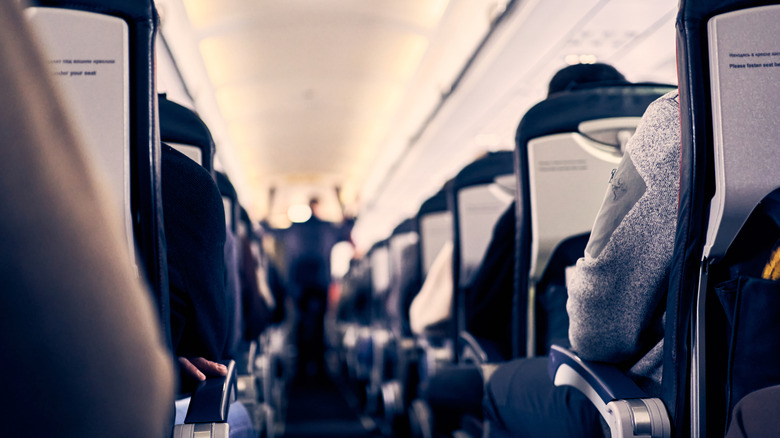Why Some Airlines Spray Pesticide In The Cabin Before Takeoff, And Is It Safe?
Anytime the word "pesticide" comes up in public discourse, it tends to spark concern. These chemicals are designed to kill pests like mosquitoes, weeds, molds, mildews, and anything else that threatens crops or public health. In larger quantities, pesticides can harm people and ecosystems too. Yes, pesticides are sometimes used on airplanes, but there's a reason — and it's pretty straightforward.
Certain countries require flights to be sprayed with them to kill harmful insect-borne pathogens, like Zika, malaria, and dengue. Some planes are sprayed and wiped down before passengers board — which reportedly kills insects for up to 8 weeks, according to the Centers for Disease Control and Prevention (CDC) — while others are disinfected during the flight.
Each country sets its own rules, but the U.S. Department of Transportation says the likes of Ecuador, India, Seychelles, and Zimbabwe require an aerosolized pesticide to be sprayed on all inbound flights while passengers are on board. Countries like Australia, New Zealand, Jamaica, and Chile allow flights to be disinfected before passengers board the plane. Yet other countries assess the need for pesticides on a case-by-case basis, such as flights to Thailand from areas where yellow fever is present or flights to Egypt from countries dealing with the Zika virus.
What's in airline pesticide spray and is it harmful?
Pesticides have been used on airlines since the 1940s for "disinsection," which the Centers for Disease Control and Prevention describes as "the process of applying pesticides to kill insects." The most common chemical used in these pesticides is permethrin, which kills mosquitoes, ticks, and mites — all of which are vectors for pathogens. Dr. Michael Policastro, a Cincinnati-based toxicologist and physician, told USA Today that the goal of permethrin "is to disrupt the nervous system of insects and spare humans the same level of effect." However, Policastro added that there is "a limited amount of literature that looks at long-term exposures in low concentrations to the air flight staff, meaning pilots and flight attendants."
Aircraft pesticides are typically World Health Organization-approved. But, as the CDC reports, they contain a mixture of "solvents, propellants, surfactants, and synergists." The CDC says more research is needed on the effects of long-term exposure to these mixtures. It's also already agreed that such pesticides can be an irritant to infants, pregnant mothers, the elderly, asthmatics, and others with underlying health conditions.
The CDC notes that, while pesticides used in aircraft are generally not thought to trigger allergies or asthma, there have been reports of "allergic sensitization, asthma symptoms, and anaphylaxis" related to exposure to disinsection products on commercial airplanes.

